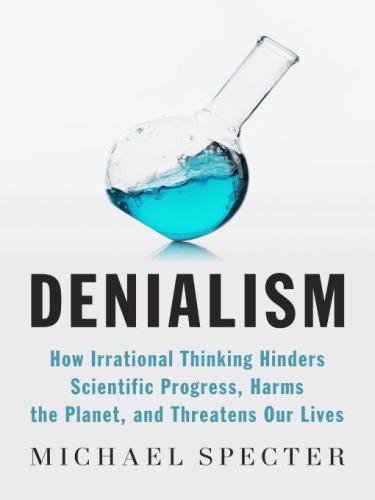
Denialism
How Irrational Thinking Hinders Scientific Progress, Harms the Planet, and Threa
کتاب های مرتبط
- اطلاعات
- نقد و بررسی
- دیدگاه کاربران
نقد و بررسی

September 14, 2009
Although denialists, according to Specter, come from both ends of the political spectrum, they have one important trait in common: their willingness to “replace the rigorous and open-minded skepticism of science with the inflexible certainty of ideological commitment.” Specter analyzes the consequences of this inflexibility and draws some startling and uncomfortable conclusions for the health of both individuals and society. For example, though every reputable scientific study demonstrates the safety of major childhood vaccines, opponents of childhood immunization are winning the publicity war; childhood immunizations are tumbling and preventable diseases are increasing, often leading to unnecessary deaths. Specter, a New Yorker
science and public health writer, does an equally credible job of demolishing the health claims made by those promoting organic produce and all forms of “alternative” medicine. Specter is both provocative and thoughtful in his defense of science and rationality—though he certainly does not believe that scientists are infallible. His writing is engaging and his sources are credible, making this a significant addition to public discourse on the importance of discriminating between credible science and snake oil.

October 1, 2009
From New Yorker staffer Specter, a sarcasm-drenched denunciation of all who will not kneel at the altar of science.
"Denialists," as Specter calls such people,"shun nuance and fear complexity, so instead of asking how science might help resolve our problems, they reject novel strategies even when those strategies are supported by impressive data and scientific consensus." Never mind that consensus once supported the idea of an Earth-centric universe and of epilepsy as a sign of demonic possession, and never mind Specter's own lack of nuance in lumping climate-change deniers, GM-food opponents, anti-vaccination activists and other such types into a single category. Are those who worry about the prospect of eating genetically altered food really on a par with Holocaust deniers? Specter seems glad to equate them, and to accuse any such worriers of being glad to condemn African villagers to lives of famine and misery. Are organic foodies evil? Apparently so ("the Western cult of organic food is nothing more than a glorious fetish of the rich")—never mind the fact that nonorganic farming is an innovation scarcely a century old and that eating fossil fuel is not very good for anyone. Specter rolls a few fuzzy-math dice along the way—at one point he gives the appearance that the 2,000-odd Americans who died of aspirin poisoning in 2008 were merely victims of bad luck—and he advances a few straw-man lines of argument that would make a college-composition student blush. Readers will need to be comfortable with the idea that Big Pharma loves them, corporate culture cares, industrial agribusinesses are in it for the public good and bacteriologists stand next to the Godhead.
Denialism, it would seem, includes denying that science has ever caused harm. Specter's spirited approach to his subject is admirable, but his brush is far too broad and his disdain far too deep.
(COPYRIGHT (2009) KIRKUS REVIEWS/NIELSEN BUSINESS MEDIA, INC. ALL RIGHTS RESERVED.)

October 15, 2009
Written in a journalistic style similar to Malcolm Gladwell's "Blink", this is a self-proclaimed polemic against all who would deny the promise and progress of science, people whom the author calls "denialists." Using the word to refer to a range of people and views, Specter, a "New Yorker" staff writer who focuses on science, technology, and public health, argues they "replace the rigorous and open-minded skepticism of science with the inflexible certainty of ideological commitment." Much of what Specter writes is good and true. People are not good judges of risk. Vaccinations are vital to people's health. And politics and ideology should not replace science. Yet Specter's extreme scientific exceptionalism, his oversimplification of complex issues and historical episodes, and his near-comical characterization of the denialist make this a hard pill to swallow. VERDICT Many, especially the skeptical and the scientifically inclined, will find arguments that trade on generalities, ignore subtleties, and caricature the opposition suspect. Thus, Specter's book is unlikely to ring true to the believer in science or to convert the unbeliever. Not recommended.Jonathan Bodnar, Georgia Inst. of Technology Lib. & Information Ctr., Atlanta
Copyright 2009 Library Journal, LLC Used with permission.

October 15, 2009
Written by a New Yorker staff journalist who specializes in public health, this work reports on the influence of activists, often celebrities, who reject mainstream medical science. Collecting their attitudes under the rubric of denialism, Specter relentlessly reproves their arguments, identifies the fears behind denialism, and refracts as refutation the views of genuine scientists who research the specific health topic at hand. Most issues are of recent or current vintage, such as opposition to childhood vaccinations, which cause autism, according to activists such as Robert F. Kennedy Jr. To denialists, the late scandal about the anti-inflammatory drug Vioxx confirmed their conspiracy theories about Big Pharma because, they concluded, if one company concealed damaging information about its product, every drug company does. Finding the denialist mentalitysuspiciousness of connections between science and commerce, a yearning for the simple and natural over the complicated and artificialbehind the popularity of organic foods and vitamins, Specter critiques claims of health benefits emanating from those arenas. Dubious about alternative medicine, Specter advocates for clinical medicines superiority.(Reprinted with permission of Booklist, copyright 2009, American Library Association.)

























دیدگاه کاربران